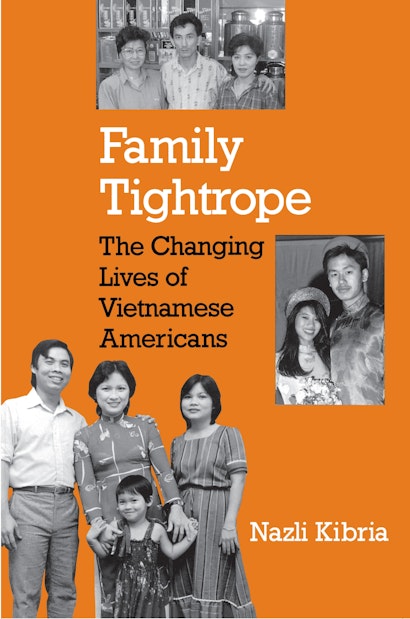In recent years the popular media have described Vietnamese Americans as the quintessential American immigrant success story, attributing their accomplishments to the values they learn in the traditional, stable, hierarchical confines of their family. Questioning the accuracy of such family portrayals, Nazli Kibria draws on in-depth interviews and participant observation with Vietnamese immigrants in Philadelphia to show how they construct their family lives in response to the social and economic challenges posed by migration and resettlement. To a surprising extent, the “traditional” family unit rarely exists, and its hierarchical organization has been greatly altered.
Nazli Kibria is Assistant Professor of Sociology at Boston University.
"While confusion reigns about the status of and prospects for the family life of the American 'majority,' this study conveys an insightful understanding of one patch of the dynamic American quilt."—Paul D. Starr, International Migration Review
"At all points, Kibria's argument is clear and compelling, and is well-supported by sociological and related research. The study makes for enjoyable reading."—Choice
"Using ethnographic research conducted in a small Vietnamese community in Philadelphia, the author shows how Vietnamese immigrants reorganize their family lives in response to the social and economic conditions encountered in the United States. . . . The author argues that migration and resettlement have changed traditional Vietnamese family life far more than they have reinforced it, and the changes have brought conflicts and tensions to Vietnamese immigrant families. . . . This book is a valuable addition to the literature on both Vietnamese Americans and immigrant families examining the effects of migration and adjustment changes in gender relations."—Contemporary Sociology
"This well-researched and gracefully written "participant-observer" study makes a significant contribution to knowledge about the impact of immigration and Americanization on family life. . . . valuable for historians, social workers, educators, and others interested in issues of cultural adaptation and family life."—Maxine S. Seller, American Historical Review
"Kibria has produced the most insightful study to date about the accommodations, frustrations, and small victories that some Vietnamese have experienced as they reconstructed their shattered lives on American soil. . . . Family Tightrope is a clearly written and well-argued book that makes an important contribution not only to our knowledge of Vietnamese refugees but also to a more general understanding of immigrant adaptation and how ethnic identity is repeatedly reconstructed over time."—The Journal of American History
"The first book devoted exclusively to the study of changing family household, gender, and generational relations within the Vietnamese-American community. It is valuable not only because it shatters the stereotype of the unchanging Confucian family but also because it provides a testable framework for tracing patterns of relative economic success and failure in Vietnamese and possibly other communities."—James Freeman, author of Hearts of Sorrow: Vietnamese-American Lives
"This book is valuable not only because it shatters the stereotype of the unchanging Confucian family but also because it provides a testable framework for tracing patterns of relative economic success and failure in Vietnamese and possibly other communities. This is an excellent book. I recommend it highly."—James Freeman, San Jose State University

